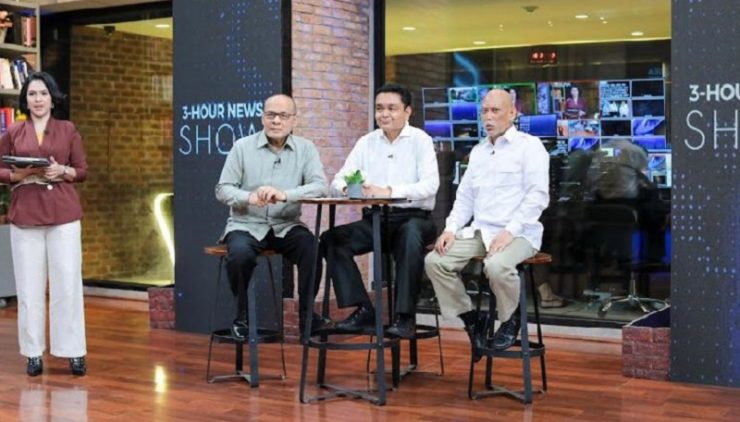TAKING place at the SEA Today Studio, there was an interactive dialogue about coffee. Three Indonesian diplomats gave their responses regarding the development of coffee in Indonesia and in the world. The host was Rahma Alia. Meanwhile, those interviewed were Prayono Atiyanto, Djumantoro Purbo and Bagas Hapsoro. All three are former ambassadors who have completed assignments in multilateral and bilateral missions.
Before they were interviewed, the three diplomats were warmly welcomed by Aderia as the Editor-in-Chief of SEA Today. Many things were discussed from: why the coffee diplomacy started to be intense, the difficulties in promoting Indonesian coffee around the world, and what is unique about Indonesian coffee.
“Coffee diplomacy is a new tool for Indonesia’s soft power diplomacy to strengthen Indonesia’s bilateral and multilateral relations with various countries, which are carried out by not only state actors, but also non-state actors including individuals”, said Prayono Atiyanto, a former Indonesian Ambassador to Azerbaijan.
Meanwhile Bagas Hapsoro mentioned that in the context of international relations, Indonesian coffee diplomacy is a nation branding effort that aims to form a positive national image of Indonesian culture, while at the same time creating opportunities for economic cooperation to improve the welfare of the Indonesian people.
When asked about then the difficulties in promoting Indonesian coffee around the world, Bagas responded that efforts to increase Indonesia’s coffee exports are still facing a number of challenges. “There are tariff and non-tariff barriers, as well as increasing competition and requirements to enter the global market, including sustainable certification requirements, for reasons of environmental protection,” said the former Indonesian ambassador to Sweden.
Protectionism is a common enemy
“The condition of inequality due to protection is contrary to spirit of cooperation as stipulated in the international norms and rules,” highlighted Prayono Atiyanto.
Prayono further said that Indonesia is a coffee exporting country and together with other Southeast Asian countries it will become an economic powerhouse. Going forward, the Southeast Asia region will remain a center of growth. “Thus, the partnership with Indonesia and the rest of the ASEAN member states will certainly be profitable,” Prayono remarked.
For this reason, he again encouraged the importance of partnerships based on the UN Sustainable Development Goals, especially regarding the empowerment of farmers. “From the multidimensional pandemic and crisis that we are currently facing, we have learned an important lesson that growing and prospering together is the only option. We not only have to move forward together, but also have to move forward equally,” he added.
Culture of coffee has also received attention
Regarding the relationship between coffee and culture, Djumantoro explained that culturally, coffee also includes brewed coffee. Kopi tubruk (ground coffee) is one of the many ways to enjoy black coffee in Indonesia. A simple way of brewing coffee but with quite a long history.
The culture of brewing coffee traditionally has been known and practiced by Indonesian people for a long time. “Very easy steps. Simply pour hot water into a cup that has been filled with ground coffee according to the measure, then serve without removing sediment or coffee grounds,” said Djumantoro, the former Indonesian Ambassador to Slovak Republic.
Even in every coffee competition around the world, coffee taste is assessed using this brewing or cupping technique. “We sure do proud, because until now brewing is the only technique in the world used to explore the taste of coffee. Because with this method the aroma, taste and character of coffee will be felt clearly,” he added.
How is the continuity of the copy of diplomacy with the world current recession? “In fact, we are passionate about advancing Indonesian coffee,” they responded in a unison.
According to Bagas, everyone already knows that Indonesia has more than 17 geographical indications that are recognized worldwide. Geographical indications are signs that indicate the area of a product that focuses on geographical environmental factors to increase the selling value of the product. Quality coffee can be planted and harvested everywhere.
“Coffee can be found on all 6 major islands, such as Sumatra, Java, Sulawesi, Kalimantan, Bali. Papua. All coffee can be specialty grade as long as we process coffee with standardized methods (pick red, dry clean, clean water, store in warehouse),” he noted.
Games about the characteristic of Indonesian coffee
The event became even more interesting when other co-hosts were asked to answer various types of Indonesian coffee. The three diplomats became “the judges” and assessed the co-hosts, namely Rory Asyari and Maria Harfanti, whether they had correctly answered the questions in the form of existing criteria.
Then a wide screen is shown which describes the characteristics of 3 coffees from Indonesia. Rory has rightly answered Gayo Arabica, while for other criteria, Maria answered correctly the criteria for having Flores Bajawa and Mandailing coffee. The co-host’s answers were all correct by “the judges.
Prayono mentioned that Gayo coffee has a taste that is not bitter and has low acidity and has a slight touch of sweetness. Hence, Gayo Coffee is often used as a mixture of various house blend coffees.
Likewise Bagas Hapsoro said that Flores Bajawa has a distinctive and unique taste, namely a strong aroma with floral nuances, moderate acidity, medium to strong thickness, and strong shades of sweetness.
Djumantoro Purbo added that Mandailing coffee has a unique aroma with a mixture of spices, chocolate, flowers and fruits.
The SEA Today program was more than a public education. We may not realize it, but the efforts to promote the nation’s branding is a quintessential example of diplomacy, a form of public diplomacy that promotes coffee, not only has the economic value but also culture.
The tradition of preparing and drinking Indonesian coffee is highly valuable. It has the symbolic of friendship, entertainment, and hospitality. It is also a form of non-verbal communication, a key element in coffee diplomacy. It conveys trust and friendship. [traveltext.id]
















